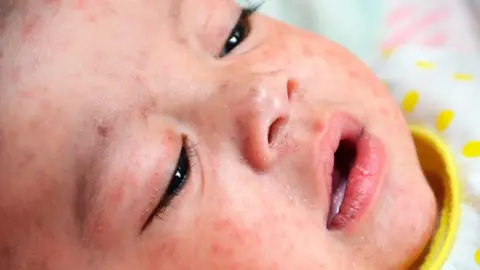Leeds measles outbreak sparks Public Health England warning
 SPL
SPLAn outbreak of measles in Leeds has sparked a warning from health chiefs.
Public Health England (PHE) said three confirmed cases and four suspected cases had been reported in the city since the beginning of October.
It is encouraging people to check their children for symptoms and get them vaccinated against the virus.
In March, the World Health Organization warned of an outbreak across Europe with 575 cases reported in the UK between February 2016 and January 2017.
The PHE said those affected in Leeds were recovering well and advised anyone with symptoms "to stay at home and phone their GP".
It said it was working with the city council and the NHS to get children vaccinated with two doses of the MMR (measles, mumps and rubella) jab.
Helen McAuslane, a PHE consultant, said: "Measles is extremely infectious to anyone who may not be immune.
"If you think you could have measles, it is really important to stay away from areas where you could come into contact with lots of other people - especially vulnerable patients in hospitals, care homes or other settings."
She said measels could "lead to severe complications, especially in people who are particularly vulnerable or have other health conditions".
"Most healthy adults will have developed some immunity to measles but can still receive two doses of the vaccine from their GP too," she added.

Measles
- Measles is spread by direct contact and through the air by coughs and sneezes
- The virus remains active and contagious on infected surfaces for up to two hours
- The first signs of infection are usually a high fever and cold-like symptoms, such as a runny nose
- You may notice small white spots on the inside of the cheeks as well
- After several days, a rash develops, usually on the face and neck first and then spreading to the body and limbs
- An infected person can pass on the virus to others from four days prior to developing the skin rash to four days after the rash erupts
- There is no treatment, but two doses of vaccine can prevent infection in the first place
- Unvaccinated young children are at highest risk of measles and its complications, including death
